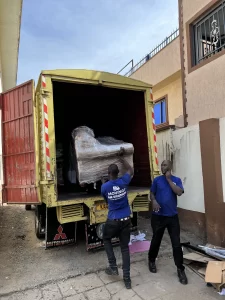A seamless transition while moving or relocating in Kenya requires an awareness of the shipping procedure. Whether you are sending items overseas or relocating to a new city, using reputable Nairobi movers is essential to guaranteeing your valuables arrive promptly and safely.
East African nation of Kenya provides a dynamic and varied environment for people and enterprises alike. Nairobi, the country’s vibrant capital, serves as the primary hub, drawing tourists from around the world who are keen to explore its diverse cultures, breathtaking scenery, and promising economic prospects. Before starting your relocation, it’s crucial to be well-informed because shipping processes might be complicated.
In this article, we will provide you with valuable insights and guidance on navigating the shipping process in Kenya. From choosing the right Nairobi movers to understanding the necessary documentation and insurance options, we want to ensure that your relocation is as smooth as possible. So, let’s dive in and discover the key factors to consider when shipping in Kenya.
Understanding the shipping process in Kenya
When planning a move to Kenya, it is crucial to have a comprehensive understanding of the shipping process. From customs regulations to documentation requirements, being well-informed will help you navigate the shipping process smoothly and avoid any unnecessary delays or complications.
Customs Regulations
Customs regulations play a vital role in the shipping process in Kenya. It is essential to comply with the country’s customs laws to ensure a hassle-free importation of your belongings. Some key points to consider include:
- Familiarize yourself with Kenya’s import restrictions and prohibited items to avoid any issues during customs clearance.
- Ensure that all necessary documentation, such as a detailed inventory of your goods, is prepared accurately and in compliance with customs requirements.
- Be aware of any specific duties, taxes, or fees that may apply to your shipment and make necessary arrangements for payment.
Documentation Requirements
Proper documentation is crucial for a smooth shipping process in Kenya. Here are some essential documents to prepare:
- Valid identification documents, including passports and visas, for all members of your household.
- A comprehensive inventory list of the items you are shipping, including descriptions, quantities, and values.
- Proof of ownership or purchase invoices for valuable items.
- Customs declaration forms, including the C32 form, which is required for non-commercial shipments.
Shipping Methods
When shipping your belongings to Kenya, you have various methods to choose from. The most common methods include:
- Air Freight: If you need your items to arrive quickly, air freight can be a suitable option. However, it is typically more expensive compared to other shipping methods.
- Sea Freight: Sea freight is a cost-effective option for shipping larger volumes of goods. It may take longer than air freight, but it offers more flexibility and affordability.
- Land Freight: If you are moving from a neighboring country, land freight can be a convenient option. It involves transporting your belongings by road, either in a shared or dedicated truck.
Each shipping method has its own advantages and considerations. It is important to assess your specific needs and budget to determine the most suitable method for your relocation to Kenya.
Understanding the shipping process in Kenya is essential for a successful and stress-free move. By familiarizing yourself with customs regulations, preparing the necessary documentation, and choosing the appropriate shipping method, you can ensure a smooth transition to your new home in Kenya.
Navigating the Shipping Process in Kenya: A Comprehensive Guide
Shipping goods in Kenya involves a multifaceted process that requires understanding various elements such as customs regulations, documentation, and logistics. With its strategic location in East Africa and bustling ports, Kenya serves as a vital hub for regional and international trade. In this article, we delve into the intricacies of the shipping process in Kenya, providing valuable insights for businesses and individuals alike.
-
Overview of Kenya’s Shipping Industry:
– Kenya boasts a robust shipping industry driven by key ports such as the Port of Mombasa, which serves as the gateway for maritime trade in the region.
– The country’s strategic location along the East African coastline positions it as a crucial transit point for goods destined for landlocked countries in the region, including Uganda, Rwanda, South Sudan, and parts of the Democratic Republic of Congo.
– Major shipping lines and carriers operate routes to and from Kenyan ports, facilitating the movement of goods across continents.
-
Documentation and Customs Clearance:
– Before shipping goods to or from Kenya, thorough documentation is essential to ensure compliance with customs regulations. This includes obtaining necessary permits, licenses, and certificates.
– Common shipping documents required include the bill of lading, commercial invoice, packing list, certificate of origin, and insurance certificate.
– Importers and exporters must adhere to Kenya’s customs clearance procedures, which involve declaration of goods, assessment of duties and taxes, and inspection by customs authorities.
– Compliance with customs regulations is crucial to avoid delays, penalties, or seizure of goods.
-
Port Operations and Handling:
– The Port of Mombasa, managed by the Kenya Ports Authority (KPA), plays a pivotal role in Kenya’s shipping industry. It handles various types of cargo, including containerized cargo, bulk cargo, and liquid bulk.
– Efficient port operations are essential to minimize congestion and expedite the movement of goods. The KPA continually invests in infrastructure and technology to enhance port efficiency.
– Cargo handling processes at the port involve container loading and unloading, warehousing, and transportation within the port precincts.
– Importers and exporters can leverage services offered by port operators, freight forwarders, and logistics providers to streamline cargo handling and transportation.
-
Freight Forwarding and Logistics:
– Freight forwarding companies play a vital role in the shipping process, providing end-to-end solutions for cargo transportation.
– These companies manage the logistics of shipping, including booking cargo space, arranging transportation, handling documentation, and customs clearance.
– Freight forwarders leverage their expertise and networks to optimize shipping routes, minimize costs, and ensure timely delivery of goods.
– Collaborating with reliable freight forwarders is essential for businesses seeking efficient and hassle-free shipping solutions.
-
Regulatory Framework and Compliance:
– Kenya’s shipping industry operates within a regulatory framework governed by various laws, regulations, and international conventions.
– The Kenya Maritime Authority (KMA) regulates maritime affairs and ensures compliance with safety, security, and environmental standards.
– Importers and exporters must adhere to regulations governing hazardous materials, dangerous goods, and restricted items to ensure safety and security in the shipping process.
– Compliance with international conventions such as the International Maritime Organization (IMO) conventions is imperative to uphold maritime safety and environmental protection standards.
-
Challenges and Opportunities:
– Despite its strategic advantages, Kenya’s shipping industry faces challenges such as port congestion, inadequate infrastructure, and bureaucratic processes.
– Addressing these challenges requires concerted efforts from government agencies, private sector stakeholders, and international partners to improve port efficiency, enhance infrastructure, and streamline regulatory processes.
– The shipping industry presents significant opportunities for investment and growth, including expansion of port facilities, development of inland container depots, and adoption of digital technologies for cargo tracking and management.
– Leveraging these opportunities can bolster Kenya’s position as a leading maritime hub in East Africa and stimulate economic development.
-
Conclusion
– Navigating the shipping process in Kenya requires a comprehensive understanding of customs regulations, documentation requirements, port operations, and logistics.
– By adhering to regulatory compliance, leveraging freight forwarding services, and addressing challenges with strategic initiatives, businesses and individuals can navigate the complexities of shipping in Kenya effectively.
– With its strategic location, vibrant ports, and growing infrastructure, Kenya remains a key player in regional and international trade, offering immense opportunities for those involved in the shipping industry. Contact Space Move Kenya for best relocation services







